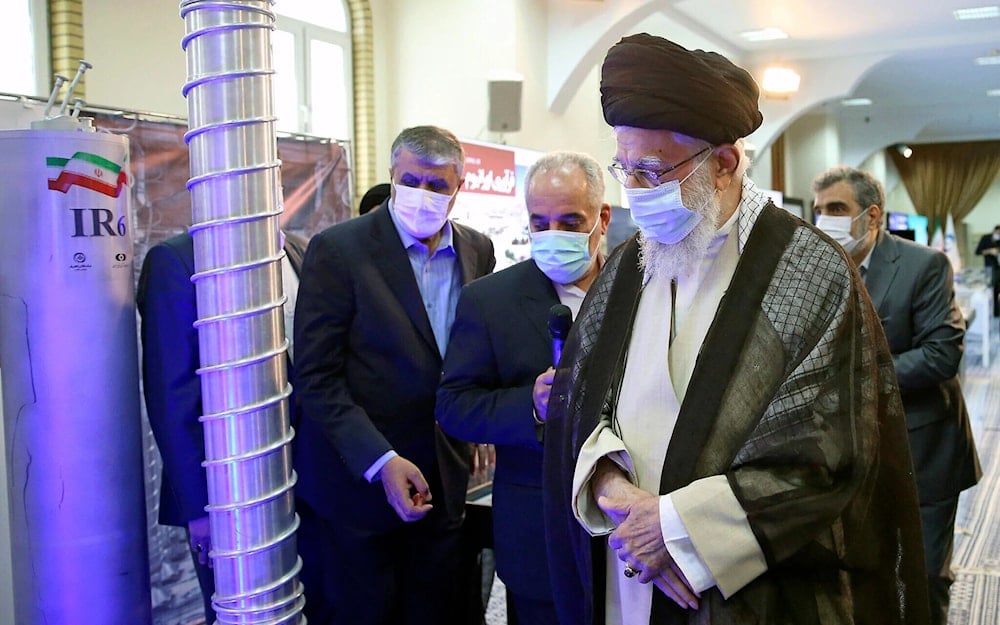'Israel' threat on Iran nuclear sites lifts oil prices: CNN
Oil prices jump as CNN reports "Israel" may strike Iran's nuclear sites, raising fears of war and jeopardizing US-Iran nuclear talks.
-

Iranian leader Ali Khamenei, right, visits an exhibition of the country’s nuclear achievements at his office compound in Tehran, Iran, on June 11, 2023. (Office of the Iranian leader, via AP)
Oil prices soared following a CNN report indicating that the Israeli occupation may be preparing to launch a military strike on Iran’s nuclear facilities.
The report, citing unnamed US officials, described new intelligence assessments suggesting that Tel Aviv is weighing a move that could derail ongoing diplomatic talks between Tehran and Washington.
Brent crude rose above $66 a barrel, while West Texas Intermediate (WTI) climbed as much as 3.5% before paring some of its gains. Although it remains unclear whether a final decision has been made by the Israeli regime, the mere possibility of such a strike injected significant volatility into global energy markets.
Nuclear talks in jeopardy as tensions escalate
Crude prices have already been volatile amid uncertain prospects for renewed Iran-US nuclear negotiations. A potential breakthrough in talks could ease sanctions on Iranian oil exports and flood the market with additional barrels, however, an Israeli assault would likely undermine any diplomatic progress, escalating tensions in a region that supplies roughly one-third of the world’s crude.
“This is the clearest sign yet of how high the stakes are in the US-Iran nuclear talks and the lengths 'Israel' may go to if Iran insists on maintaining its commercial nuclear capabilities,” said Robert Rennie, head of commodity and carbon research at Westpac Banking Corp. “Crude will maintain a risk premium as long as the current talks appear to be going nowhere.”
Following the CNN report, traditional safe-haven currencies like the Swiss franc and Japanese yen also saw brief gains before stabilizing. Meanwhile, US officials from the Department of Defense and the National Security Council declined to comment on the developments, and the Israeli embassy in Washington also offered no statement.
Analysts warn of lasting risk premium on crude
Goldman Sachs Co-Head of Global Commodities Research, Samantha Dart, warned that any military action targeting Iran’s nuclear infrastructure would likely disrupt oil supplies. While “Israel” has long considered preemptive strikes on Iran’s nuclear program, analysts note that many of the Islamic Republic’s facilities are deeply fortified and may require massive firepower to penetrate.
Past US leadership, including former President Joe Biden, had reportedly discouraged such military action, particularly during periods of heightened regional conflict.
For now, geopolitical concerns are dominating market sentiment, temporarily overshadowing expectations of oversupply later this year.
OPEC and its allies have been gradually restoring output, and US shale production continues to grow, though expansion could be limited if oil prices drop toward $50 a barrel, according to comments from ConocoPhillips CEO.
Iran sanctions and supply shifts deepen volatility
As of mid-morning trading in Singapore, Brent crude for July settlement had risen by 1.7% to $66.48 a barrel, while WTI for July delivery increased by 1.8% to $63.13 a barrel.
Earlier this week, Iran’s leader, Sayyed Ali Khamenei, expressed doubt that renewed negotiations with the US would yield any tangible results. According to Bloomberg Intelligence, if sanctions on Iranian crude exports are lifted, WTI prices could fall as low as $40 a barrel.
Despite sanctions imposed by the US, UK, and EU, Iran has continued to export oil and even increased its supply in recent months.
“Iran has increased its supply by about a million barrels a day over the last couple of years,” Dart said in a Bloomberg Television interview, adding “If you remove a million barrels a day from Iran, this could represent an upside of about $8 a barrel to the crude oil price.”

 4 Min Read
4 Min Read









